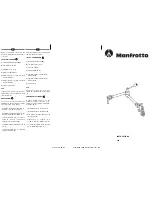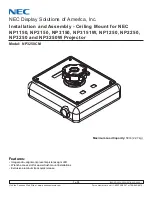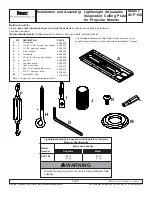
Services Menu
WiLink-I Modular Base Station System Manual
139
4.10.1.2.3
Voice Service
The Voice over IP (VoIP) service provides telephony services through an external
Voice Gateway connected to the Subscriber Unit's data port. The VoIP service is
designed for Voice Gateways, using the proprietary DRAP signaling protocol to
identify VoIP sessions and to verify optimal handling of these sessions. Upon
provisioning of such a service, the system automatically handles Signaling and
RTP connections establishment, including QoS issues.
DRAP (Dynamic Resources Allocation Protocol) is a protocol between the Gateway
(installed behind the Subscriber Unit) and the base station. The protocol provides
an auto-discovery mechanism for the Gateway, so that no specific configuration is
needed and the Gateway can automatically locate and register with the base
station. The protocol uses a few simple messages enabling a Voice Gateway to
request resources when calls are made, and the base station to dynamically
allocate them.
Using the DRAP solution has the following advantages:
¢
Maintain telephony toll quality over the wireless network - dynamically
allocate Continuous Grant (CG) connections for active calls, maintaining the
QoS and low jitter needed for toll-quality voice services.
¢
Allocate CG bandwidth only for the duration of the call - the air resources are
allocated and released according to the DRAP messages, which are based on
the VoIP signaling. This dynamic allocation ensures efficient use of the air
resources.
¢
Prevent callers from placing calls if a sector is overloaded - the operator can
control and limit the maximum number of concurrent calls per wireless sector
and per end user voice gateway. Thus, the operator has complete control of its
network and the resources in it.
¢
Automatic support of Codec changing in a VoIP call - the DRAP messages
update the WiLink-I equipment on any Codec change or subsequent
bandwidth allocation change during the call, hence the exact required
bandwidth is always provided. This is essential in fax transmissions where the
call might begin with one Codec and switch to another to accommodate the fax
transmission.
NOTE
The DRAP-based Voice Service is also available when an L2 Service is provisioned.
Summary of Contents for WiLink-I 3000
Page 1: ...System Manual WiLink I Modular Base Station SW Version 2 5 June 2006 ...
Page 16: ......
Page 20: ......
Page 24: ...4 System Description Chapter 1 System Description Figure 1 1 WiLink I System Architecture ...
Page 42: ......
Page 74: ......
Page 214: ......
Page 240: ......
















































